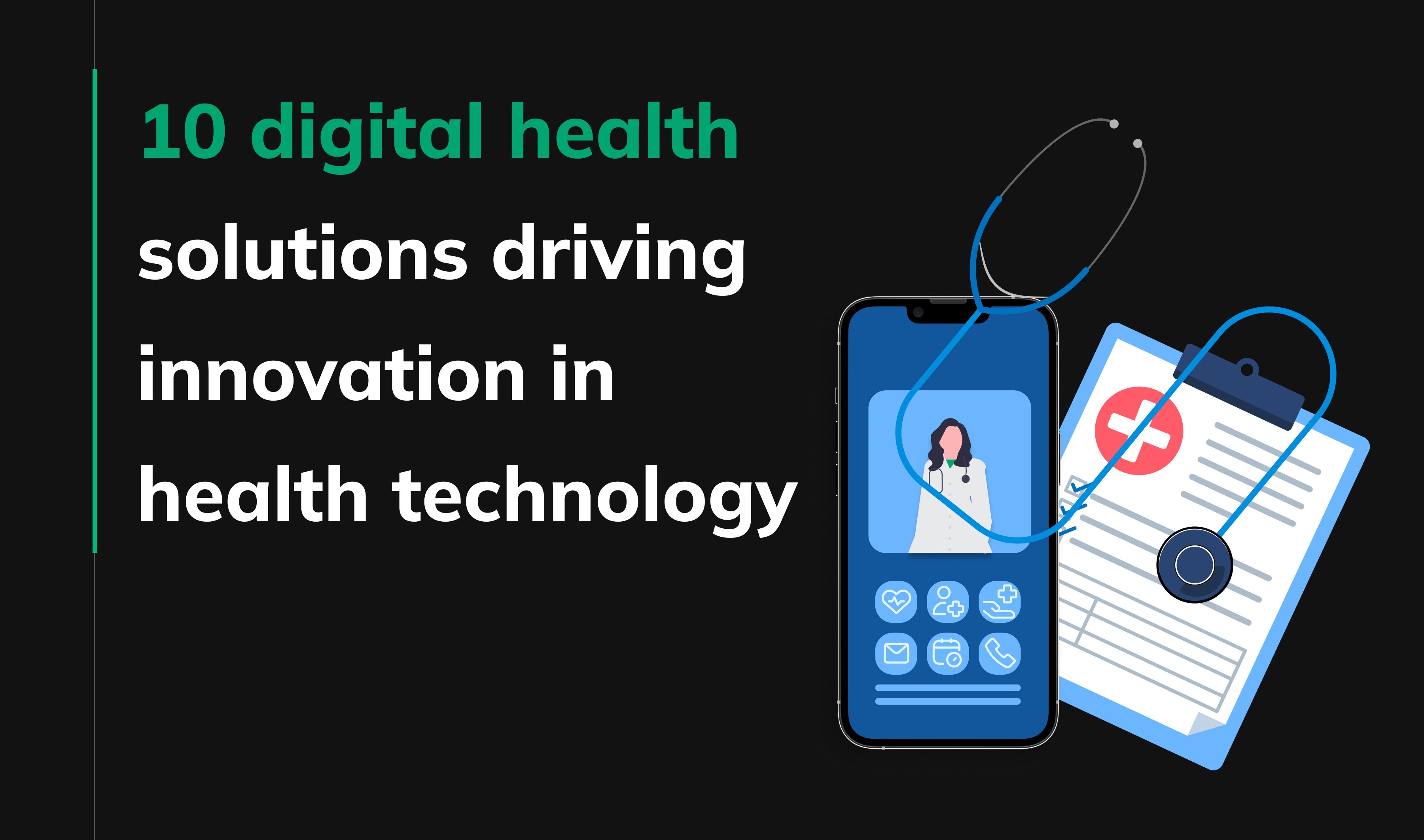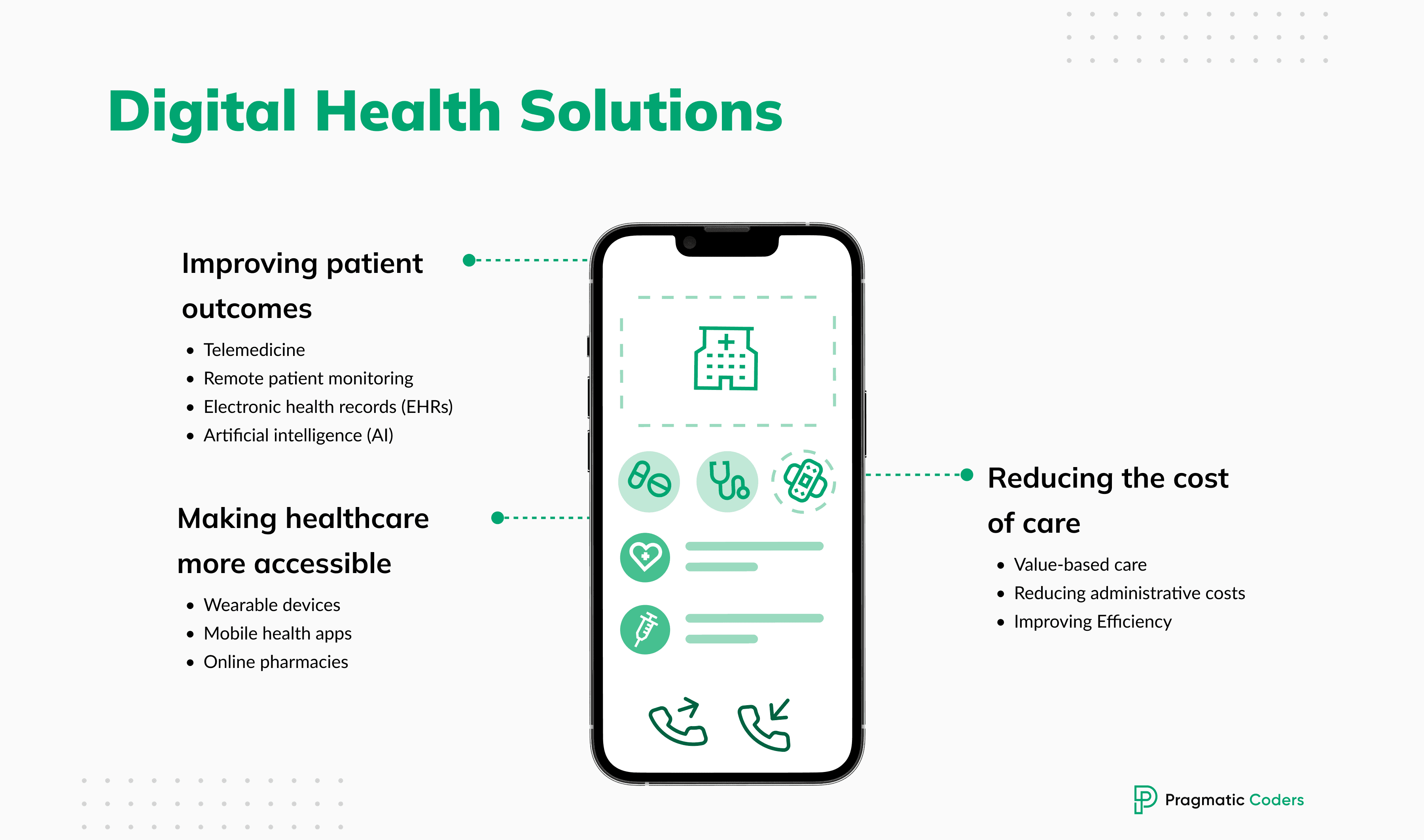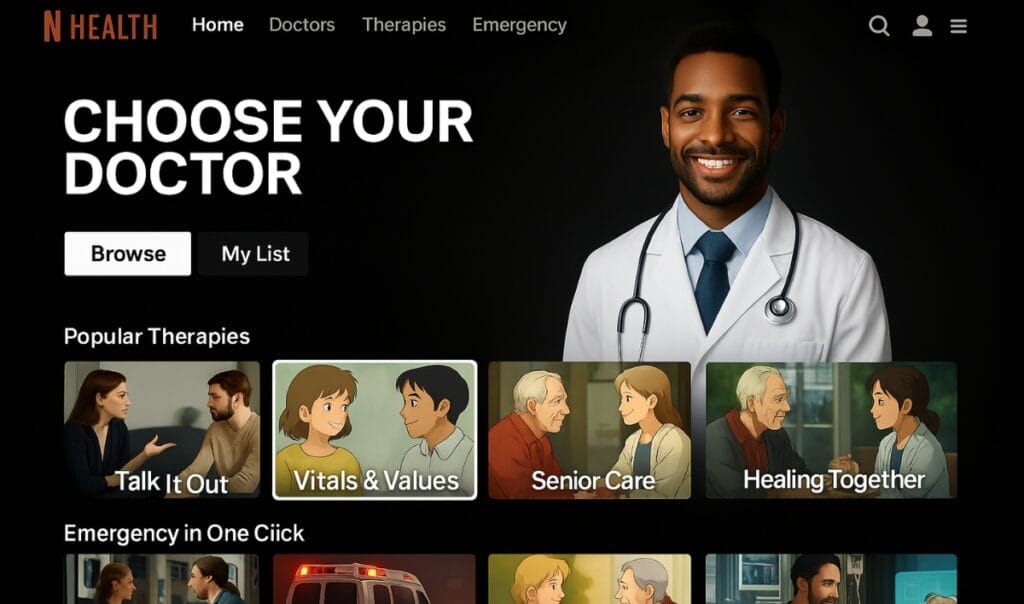10 digital health solutions driving innovation in health technology

The healthcare industry is undergoing rapid digital transformation, driven by technological advances. Concurrently, medtech software development methodologies are constantly evolving. This transformation is making medical firms more efficient, innovative, and adaptable. Healthtech develop digital health solutions that help healthcare companies improve their operations and deliver better care to patients – in 2025, top digital health startups focus on AI-powered, personalized, and predictive healthcare. Meanwhile, patients who leverage the potential of digital health enjoy lower costs and better outcomes. In this article, we’ll explore how digital health companies are revolutionizing healthcare.
Key Points
|
Health technology for improving patient outcomes
In the ever-evolving healthcare landscape, digital health solutions and strategies are playing a pivotal role in improving patient outcomes. This chapter will explore some of the key ways in which digital health is helping healthcare companies to achieve this fundamental objective.
Telemedicine for better patient engagement
Telemedicine enables patients to consult with doctors remotely, eliminating the need to travel to a hospital or clinic. This can be especially beneficial for patients in rural or underserved areas. It is also advantageous for patients with chronic conditions who need to see their doctor frequently.
Additionally, telemedicine can enhance patient satisfaction and quality of life. By reducing the need for patients to travel to and from appointments, telemedicine can save patients time and money. It can also be more convenient and less disruptive to patients’ daily lives.
Meeting patient needs with remote monitoring
Remote patient monitoring (RPM) allows healthcare companies to track patients’ health status outside of the clinic setting. This can be done using wearable devices, such as smartwatches and fitness trackers, or through mobile apps.
RPM can help to identify potential problems early on and prevent complications. For example, RPM can be used to track patients’ blood pressure, blood sugar levels, and heart rate. If any of these metrics fall outside of a healthy range, the patient’s healthcare team can be alerted and take appropriate action. It can also be used to track patients’ mental health status, such as their mood and symptoms of depression and anxiety.
Remote patient monitoring gathers health data from patients in their own homes, but ambient intelligence goes a step further. Instead of patients actively providing data, ambient health monitoring uses sensors and AI to subtly track a patient’s health right where they live. Such a system can, for example, automatically detect a fall in an elderly person’s home and call for help.
Electronic health records (EHRs)
EHRs are digital versions of patients’ medical records. These digital health solutions allow healthcare providers to access and share patient information seamlessly, which can improve the coordination of care and reduce medical errors.
EHRs can also provide healthcare companies with valuable data that can be used to improve patient outcomes and population health. For example, EHR data can be used to identify trends in patient populations and develop targeted interventions to improve care. Moreover, such systems can improve the efficiency of healthcare operations and significantly reduce costs.
Artificial intelligence in digital healthcare
AI is being used to develop new tools and technologies that can help healthcare companies improve the quality of care they provide. For example, AI is being used to develop new drugs and treatments, improve the accuracy of diagnoses, and personalize the care plans for individual patients.
For example, AI is being used to develop new drugs and treatments that are more targeted and effective than traditional therapies. It is also used to improve the accuracy of diagnoses by helping doctors identify patterns in medical images and data that may not be visible to the naked eye. Additionally, it is utilized to personalize care plans for individual patients by considering their unique medical history, genetic makeup, and lifestyle factors. This can ensure that patients receive the most effective care possible.
Making healthcare more accessible
Telemedicine, remote patient monitoring, EHRs, and AI are key components that are reshaping patient care and driving improvements in healthcare outcomes. They are, however, just a part of the digital revolution in healthcare. Digital health solutions that make healthcare more accessible are an equally important part of the equation.
Wearable devices
Wearable devices, such as smartwatches and fitness trackers, are becoming increasingly popular for tracking health data. These digital tools are equipped with special sensors that allow patients to manage their health. They can track a variety of metrics, including activity levels, heart rate, sleep patterns, and blood pressure. This data can be used by healthcare companies to better understand patients’ health needs, provide more personalized care, and improve health outcomes.
For example, data from the wearables can be used to identify patients who are at risk for developing chronic diseases, such as heart disease or diabetes. This information can then be used to develop targeted interventions to help patients prevent these diseases. Additionally, wearable device data can be used to track patients’ progress with treatment plans and make adjustments as needed.
Mobile health applications
Mobile health (mHealth) apps are another way to make healthcare more accessible through smartphones. These digital technologies can be used to provide patients with access to health information and tools, such as medication reminders, symptom trackers, and appointment scheduling. This can help patients to better manage their own health and stay connected with their clinician.
As an example, mobile health apps can be used to help patients with chronic diseases, such as diabetes or asthma, to manage their condition. These apps can provide patients with reminders to take their medications, track their symptoms, and log their blood sugar levels or asthma attacks. Moreover, mHealth apps can be used to connect patients with their healthcare providers for virtual consultations.
Online pharmacies
Online pharmacies can provide patients with convenient and affordable access to medications. This can help improve patient adherence to medications and reduce healthcare costs. One of the main benefits of online pharmacies is that they can offer lower prices than traditional ones. This is because online pharmacies have lower overhead costs, such as rent and employee salaries. Additionally, they can offer a wider range of medications, as they’re not constrained by limited shopping space.
Another benefit of online pharmacies is their convenience. Patients can order their medications online and have them delivered to their homes. This can save them time and hassle, especially if they have difficulty traveling to a pharmacy.

Reducing the cost of healthcare with digital health solutions
As digital health continues to evolve, we can expect to see even more innovative solutions that make healthcare more accessible, streamlined, efficient, and, as a result, much cheaper.
Value-based healthcare
Value-based care is a healthcare delivery model that focuses on improving patient outcomes and reducing costs. Digital health companies help healthcare providers adopt value-based care models by developing and implementing new care models and technologies.
For example, digital health companies develop remote patient monitoring programs that help to prevent complications and reduce the need for hospitalizations. Additionally, they create personalized care plans that help to improve patient outcomes and reduce costs.
Reducing administrative costs with health technology
Digital health technologies can help to reduce administrative costs by automating tasks such as scheduling appointments, processing claims, and managing patient records. This can free up healthcare providers to focus on patient care and reduce the need for administrative staff.
Automation not only streamlines administrative processes but also enhances overall healthcare efficiency. Moreover, it significantly decreases the likelihood of errors and improves patient safety by minimizing the risk of misplaced or lost records.
Improving efficiency using digital solutions
Digital health technologies are helping to improve the efficiency of healthcare operations in a number of ways. For example, electronic health records (EHRs) are helping to reduce the amount of time that healthcare providers spend on paperwork and improve the coordination of care between different healthcare providers. Artificial intelligence is also being used to automate tasks such as reviewing medical images and diagnosing diseases, which can free up healthcare providers to focus on patient care.
Conclusions
As technology continues to evolve, we can expect to see even more innovative and groundbreaking digital health solutions that revolutionize the healthcare industry. By investing in digital health technologies, partnering with digital health companies, and educating and empowering patients, healthcare companies can position themselves to succeed in the future of digital health.




